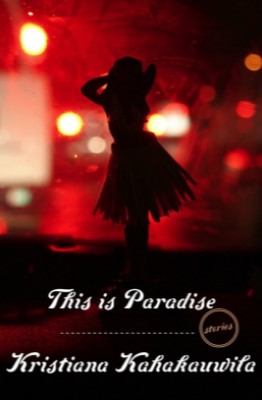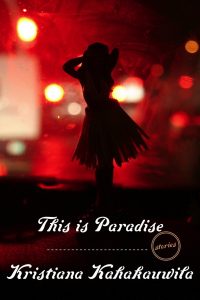
In March 2021, the Indigenous Literature Reading Group met to discuss Kristiana Kahakauwila’s short story collection, This is Paradise (Hogarth, 2013). Incoming CISC PhD student Milly Mulcahey offers a summary of the discussion.

Cover image of Kristiana Kahakauwila’s short story collection This is Paradise
Hula dancers, pristine beaches and crystal blue waters are the images we expect or even demand of Polynesia – a dream holiday destination. This image of a pristine “paradise” has defined English perceptions of the region since the early 1770s. Kristiana Kahakauwila’s This is Paradise expertly deconstructs this mythology, presenting the reader with six short stories that are at once intimately Hawai’ian and universally relevant. Kahakauwila introduces the reader to complex and contested notions of belonging through characters that anxiously and self-consciously make claims to shared and distinct identities.
The stories move across the lines of Kanaka Maoli (Indigenous Hawai’ian) and Haole (foreigners), disrupting the perceived binary between the two. As a reading group, we considered how the stories reject a limited view of Indigenous identity. Kahakauwila utilises the short story genre to present a rich diversity of individual identities within which Indigeneity is a complex, negotiated part. Within the stories we meet a Hawai’ian man who feels more at home in the US where he can live openly as a gay man, and a Haole man accepted as ‘local’ for his musical talent. The boundaries of Indigeneity and colonial influence are thereby presented as complex and changing. Throughout, Kahakauwila focuses on human stories within which the impacts of colonialism are hard to define, and differently negotiated. This renders This is Paradise essential reading for Indigenous Studies researchers who grapple with a tension summarised by Henry Louis Gates Jr:
‘You can empower discursively the native, and open yourself up to charges of downplaying the epistemic (and literal) violence of colonialism; or play up the absolute nature of colonial domination, and be open to charges of negating the subjectivity and agency of the colonized, thus textually replicating the repressive operations of colonialism.’ (Gates, qtd. in Edmond 1997, p.10)
Kahakauwila does neither. Her stories consistently encounter death, and yet the narrative never becomes overwhelmingly morbid. Instead, Kahakauwila threads through moments of humour and hopefulness, including a drinking game at a funeral. Interweaving relatable stories with Hawai’ian language and concepts, Kahakauwila encourages the reader to relate to her characters, while reminding us of our position as Haole or outsider. The reading group reflected on our own “holiday headspace” and our expectations of “paradise”. We considered how we can easily overlook the impact of our presence, and the potential violence of the translation of languages and cultures into English for the tourist economy.
The reading group reflected that they had sought this book as an escape from their reality. In particular, the recent tragic murder of Sarah Everard. Instead of finding a “paradise” escape, they were confronted with a hauntingly resonant reflection. The first short story depicts a young woman who, while on vacation, is murdered by an ex-military man. The women of the island come together to mourn, their shared experience as women temporarily transcending the tourist/local divide. That we turned to this book to find escape and were instead presented with a chilling reminder of our reality is, I suggest, the intent of Kahakauwila’s work. Kahakauwila powerfully presents a deconstruction of European “paradise” in favour of a Hawai’ian reality that is far more captivating, complex and human.
Amelia Mulcahey is an incoming PhD student at the University of Kent. She works closely with US and UK museums, and Eastern Woodlands Native peoples to improve their representation within the UK. Her brand Confidence Media houses a series of Indigenous educational projects with UK schools. You can find her on LinkedIn.